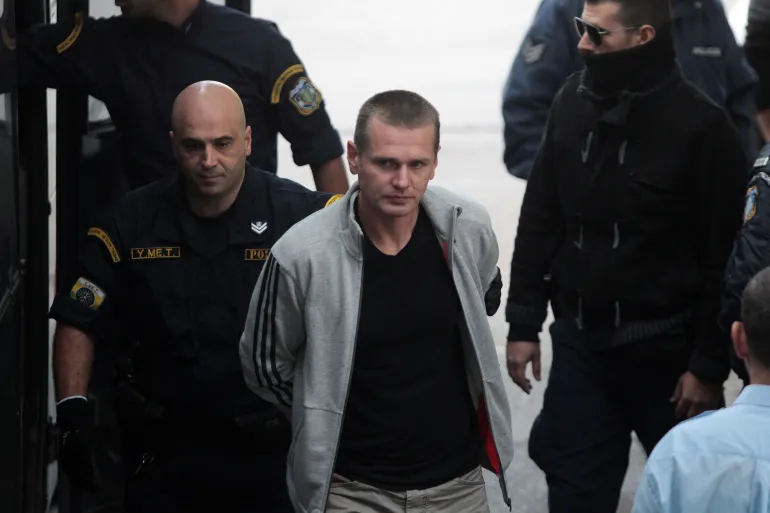The United States has freed Alexander Vinnik, a Russian cybercrime boss, in a high-profile prisoner exchange that also saw the release of American teacher Marc Fogel from a Russian prison. The move marks a significant development in diplomatic relations between Washington and Moscow as US President Donald Trump pushes forward with efforts to improve ties with Russia and seek an end to the ongoing war in Ukraine.
Vinnik, a notorious Russian cryptocurrency hacker and money launderer, was in northern California on Wednesday awaiting transportation back to Russia. According to sources cited by Reuters, he was required to forfeit over $100 million to the US government before being repatriated. The prisoner swap comes as part of a broader strategy by the Trump administration to establish new lines of communication with the Kremlin.
Vinnik was initially arrested in Greece in 2017 on money laundering charges and later extradited to the United States in 2022. His crimes included funneling approximately $4 billion in illicit funds from ransomware attacks, identity theft, drug trafficking, and other criminal activities through his now-defunct cryptocurrency exchange, BTC-e. In May 2024, he pleaded guilty to conspiracy to commit money laundering.
On the other end of the prisoner swap, 63-year-old American teacher Marc Fogel, who had been serving a 14-year sentence for drug smuggling in Russia, was released and flown to Washington. He was initially detained at a Moscow airport in 2021 after being caught with a small quantity of medical marijuana, which he claimed was for personal use due to a medical condition. His case gained widespread attention in the United States, with calls for his release intensifying over the years.
Upon arriving in Washington, Fogel was welcomed at the White House, where he celebrated his freedom with President Trump. US National Security Adviser Mike Waltz described Fogel’s release as “a show of good faith from the Russians” and suggested that it signals a positive step toward diplomatic reconciliation and an end to the war in Ukraine.
While the Kremlin acknowledged the prisoner exchange, it downplayed any immediate breakthroughs in diplomatic relations. Russian government spokesman Dmitry Peskov stated that while such exchanges contribute to “building mutual trust,” they are unlikely to lead to a swift resolution of ongoing tensions.
“Of course, such agreements are hardly capable of becoming a breakthrough moment, but at the same time, bit by bit, these are steps to build mutual trust, which is now at its lowest point,” Peskov remarked.
In a separate development, the White House confirmed the successful negotiation of another American citizen’s release from Belarus, a close ally of Russia. While US officials did not disclose the individual’s identity, they celebrated the release as a “remarkable victory” for the Trump administration and praised the president’s “dealmaking ability.”
Secretary of State Marco Rubio stated, “President Trump’s strong leadership has led to the release of an American unjustly detained in Belarus and two political prisoners. We remain committed to securing the freedom of other US citizens held abroad.”
US-funded media outlet Radio Free Europe/Radio Liberty reported that one of the freed individuals was Andrey Kuznechyk, a Belarusian journalist who was arrested in November 2021. Trump’s nominee for special envoy for hostage affairs, Adam Boehler, revealed that another American woman had been released from Belarus two weeks prior as part of a phased agreement.
Wednesday’s prisoner release marks the 11th time since Trump took office last month that an American detained abroad has been freed. The White House is portraying these diplomatic maneuvers as part of a broader effort to reestablish relations with Russia and bring the war in Ukraine to an end. Trump had previously pledged during his presidential campaign that he would resolve the conflict “within 24 hours” of taking office.
As part of these diplomatic efforts, Trump and Russian President Vladimir Putin held a one-hour phone call on Wednesday. Trump described the conversation as “very productive” and claimed that he is “on the way to getting peace” in Ukraine. The Kremlin confirmed the call and stated that both leaders had agreed to meet in the near future.
The ongoing negotiations suggest that Washington and Moscow may be inching toward new diplomatic channels, though the road to lasting peace remains uncertain. With further meetings expected between Trump, Putin, and Saudi Crown Prince Mohammed bin Salman, the world is closely watching how these high-stakes diplomatic engagements unfold.
Stay ahead with the latest news on global innovation, leadership, entrepreneurship, business, and tech. Join us on WhatsApp or Telegram for real-time updates. Have a report or article? Send it to report@theinnovationtimes.com.
Follow us on X (Twitter), Instagram, LinkedIn, Pinterest and Facebook for more insights and trends



